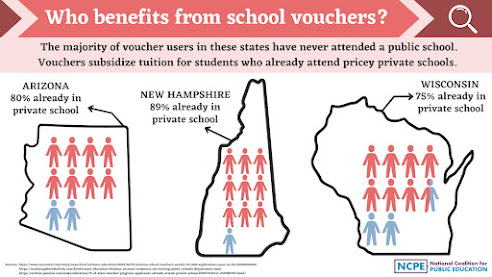Curmudgucation: How Vouchers Bust State Budgets
One of the consistent features of voucher programs is that they grow, sometimes rapidly, to suck up huge chunks of the state budget. Nobody understands this better than Arizona's Governor Katie Hobbs. She posted this memo on the Dead Bird app yesterday:
Hobbs has rung this alarm bell before. Back in July, her office noted that the price tag for the state's education scholarship account voucher program would be over $943 million, leading to a $320 million shortfall. And that doesn't just represent moving money from public schools to voucher programs. Hobbs says that the vouchers benefit 8% of the state's students, but account for more than half of the state's education spending.
How can that be? And why is it happening in other universal voucher states as well?
Two simple things.
First, universal vouchers expand the pool of students that the public pays for. Let's say that West Egg High School has 100 students, and East Egg Private Academy has 20. After universal vouchers become a thing, five public school students take their vouchers and head for EEPA (five others applied and EEPA refused to take them). At the same time, all 20 EEPA students--who have never set foot in a public school--also sign up to get their vouchers.
So, pre-vouchers, taxpayers were covering the costs for 100 students. After vouchers, the public is footing the bill for 120 students. Costs go up. Arizona opened up universal vouchers, and the vast majority of applicants were families with students already in private school. True in Iowa and Florida, as well.
Second, pro-voucher folks consistently under-estimate what the cost of the program will be (in New Hampshire they were off by over 11,000%). This is puzzling, since the question involved is "If we offer free government money to everyone who homeschools or has a child in private school, how many do you think will take it?" and that doesn't seem like a hard one to figure out.
Universal ESA vouchers like those in Arizona and Florida add a whole other level. Unaccountable voucher dollars disappear into a void, paying for all sorts of extras like big screen TVs and Disney tickets. Meanwhile, we're seeing private schools in places like Des Moines raising tuition costs because vouchers mean they can do it to increase their own revenue (increasing tuition is also a great way to keep Those Peoples' Children out).
This is how a program billed as rescue for poor families becomes an entitlement for wealthy families. And it's a reminder that a voucher pitch claiming that vouchers will somehow save tax dollars is just not true, no matter how many times voucher advocates repeat it.
Looking way down the road, I expect this will lead us to a battle between different flavors of choicers. For those who like vouchers because they are one step on the road to getting government completely out of education, the long term dream is a world in which few or no tax dollars go to education, and families have to scrape together what they can afford on their own. Those folks are going to reach a point where they want to shrink voucher sizes. But for those who like the idea of turning on the state money faucet and flooding private religious (okay, Christian) schools with free tax dollars, voucher shrinkage will be an unwelcome change that they will fight tooth and nail.
That's some years away, but we've seen previews. Croydon, NH, had a true voucher program that paid full tuition to send any student to the school of their family's choice, public or private. It was expensive, so the local Libertarians tried to scuttle it by reducing the money by half.
But that's further down the road. Right now we are on track to see more Arizona-style financial issues for states that decide to go all in on vouchers for everybody. If states are smart enough to pay attention, the lessons are there. Voucher programs inevitably grow, as advocates and legislators (but never the actual voters) try to open the money faucet wider, and as the programs grow, they become increasingly expensive.
This blog post has been shared by permission from the author.
Readers wishing to comment on the content are encouraged to do so via the link to the original post.
Find the original post here:
The views expressed by the blogger are not necessarily those of NEPC.



